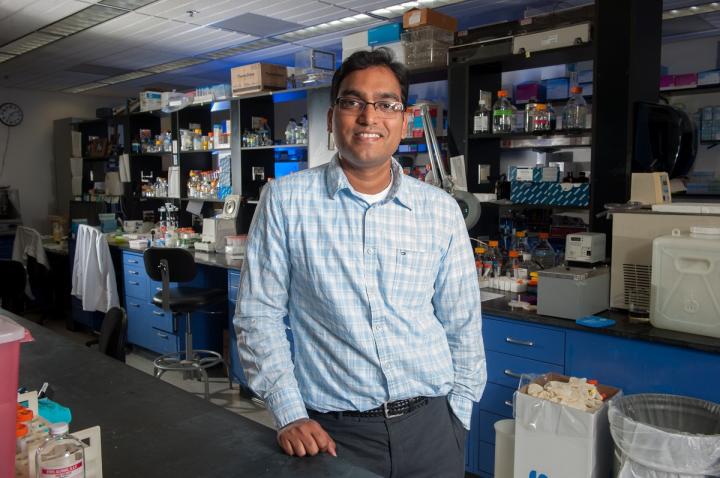Start-up company, Renovate Bioscience Inc., wins Invention of the Year and Inventor Pitch Award for this work at UMD

Credit: Edwin Remsberg, UMD
In a new paper published in Stem Cell Reports, Bhanu Telugu and co-inventor Chi-Hun Park of the University of Maryland (UMD) Department of Animal and Avian Sciences show for the first time that newly established stem cells from pigs, when injected into embryos, contributed to the development of only the organ of interest (the embryonic gut and liver), laying the groundwork for stem cell therapeutics and organ transplantation. Telugu’s start-up company, Renovate Biosciences Inc. (RBI), was founded with the goal of leveraging the potential of stem cells to treat terminal diseases that would otherwise require organ transplants, either by avoiding the need for transplants altogether or creating a new pipeline for growing transplantable human organs. With the number of people who suffer from organ failures and the 20 deaths per day in the U.S. alone purely from a lack of available organs for transplant, finding a new way to provide organs and therapeutic options to transplant patients is a critical need. In this paper, Telugu and his team are sharing their first steps towards growing fully transplantable human organs in a pig host.
“This paper is really about using the stem cells from pigs for the first time and showing that they actually can be injected into embryos and only go to the endodermal target organs like the liver, which is very important for delivering safe therapeutic solutions going forward,” says Telugu. “This is an important milestone. It’s a pipe dream in a way because a lot of things need to work out between here and full organ transplantation, but this paper sets the stage for all our future research. We can’t really just go and start working with humans in work like this, so we started with pig-to-pig transfer in this paper, working with the stem cells and putting them back into other pigs to track the process to make sure it is safe for liver production as proof-of-concept.”
Telugu and his team pitched this work at UMD Bioscience Day on behalf of his company, RBI, and received the Inventor Pitch Award and the UMD Invention of the Year Award in 2018. In order to protect the intellectual property, Telugu worked with the UMD Office of Technology Commercialization (OTC) to secure patents and open the work up for additional fundraising to carry this technology through the preclinical and clinical stages. The Maryland Stem Cell Foundation provided some funding to advance this work, and Telugu is thankful that Maryland funds technologies in the human stem cell space.
“There are many terminal cases where people need some sort of an organ replacement, like organ failure and degenerative diseases that cannot be cured by drugs,” explains Telugu. “The traditional paradigm is to find a donor organ, but as of today there are still thousands of patients waiting for transplants, and there is no keeping up with the demand. Researchers have thought for a long time that stem cells could help solve this problem, and these stem cells have the ability to go into a specific organ as opposed to those that go into any lineage. In this case, you can differentiate the cells and place them where they are needed to help rescue a diseased organ, eliminating the need for transplant or at least buying the patient some time. Just making the human liver and collecting them early from a neonatal piglet, the hepatocyte [liver] cells alone are a $3 billion opportunity per year. And in the future, we can move into organ transplantation, first with the liver, and then looking at other organs of interest like the pancreas and lungs.”
According to Telugu, this has distinct advantages over other methods that researchers are currently using to create donor organs in pigs, since the organs Telugu and his team are working with are actually of human origin and are therefore more likely to be accepted when transplanted. “Transplant rejections are pretty common even between humans and humans,” says Telugu, “and if it is such a problem normally, you can imagine how an organ from a pig could be difficult to accept and may not essentially perform the same functions. Pig proteins may not function the same, so that remains a huge barrier for other methods that are not actually growing fully human organs like ours.”
This work has the potential to solve a major problem in the treatment of organ failure and other degenerative diseases, which is what Telugu and his work is all about. “Being a veterinarian by training, we always look at the problem and try to find solutions to them,” says Telugu. “Most animal scientists operate by looking for solutions, so integrating research and entrepreneurship to get this to the market where it is needed is essential. We are one of the few groups on the planet that are working in this space, and we have a great team of embryologists here at Maryland to do this work. We are uniquely positioned to accomplish this with both genome editing and stem cell biology expertise, and being able to prove the concept with this paper is a great first step towards our goals.”
###
The paper, entitled “Extra-embryonic endoderm (XEN) cells capable of contributing to embryonic chimeras established from pig embryos,” is published in Stem Cells Reports, DOI: 10.1016/j.stemcr.2020.11.011.
Media Contact
Samantha Watters
[email protected]
Original Source
https:/
Related Journal Article
http://dx.




